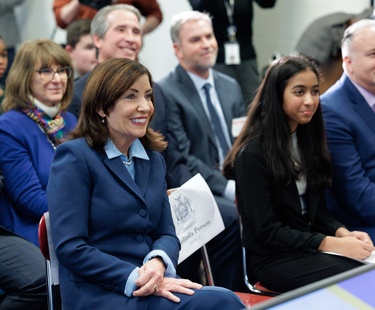Hochul launches campaign for statewide smartphone ban, starting with the next school year
— Photo from the NYS Governor’s Office
Governor Kathy Hochul was at Farnsworth Middle School in Guilderland on Wednesday to launch her campaign for “distraction-free learning.” Behind her is Guilderland Superintendent Marie Wiles; next to her is Anika Bhupati, a Farnsworth student who was on last year’s championship Future City team and spoke at Wednesday’s event.
GUILDERLAND — Governor Kathy Hochul today launched her campaign for a statewide ban of smart devices in schools at the same district where she started her listening tour on the subject last August.
“We’re going to make sure there are no smartphones, no watches, no tablets, no beeps or dings in that sacred space where children need to be learning between the bell in the morning and the bell in the afternoon,” Hochul told the crowd assembled at Farnsworth Middle School on Jan. 22.
In her executive budget, Hochul included $13.5 million for schools that need help in purchasing pouches or cubbies to store cell phones during the school day. The Guilderland superintendent, Marie Wiles, has estimated it would cost the suburban district with roughly 5,000 students about $110,000 for the next school year.
Hochul’s plan is to implement the policy for the 2025-26 school year.
Her proposal would require schools to give parents a way to contact their children during the day if needed but would allow schools to develop their own plans for storing smartphones.
Hochul’s proposal also includes exemptions to smartphone restrictions, such as for students who need to manage a medical condition or for students who need a device for their Individualized Education Program, or for other academic purposes like translation.
Hochul has also released a report, “More Learning, Less Scrolling: Creating Distraction-Free Schools,” on the findings from her listening tour as well as providing recommendations on how schools can implement the ban.
Her report says that safety is not compromised by smartphone bans and that the bans improve mental health.
Her recommendations include communicating openly with students, staff, and families; implementing the ban for the entire school day; and increasing students’ in-person engagement with clubs, sports, arts, and other programs.
On Wednesday, Hochul praised Farnsworth Middle School and its principal, Michael Laster, for implementing a bell-to-bell ban in September.
“I just talked to students now,” said Hochul. “I asked them, ‘What has been the difference since this school had the courage to stand up and, starting in September, had the policy?’ …
“Those students told me that kids are talking to each other in the cafeteria and between classes. And think about that — for that to be rather an earth-shaking announcement tells you how silent it was before.”
The governor went on, “I want to hear that noise again in every school across the state. But, kids are also missing an education.”
She cited Jonathan Haidt’s best-selling new book, “The Anxious Generation: How the Great Rewiring of Childhood Is Causing an Epidemic of Mental Illness” — a book Guilderland’s superintendent and school board members also frequently cite.
A social psychologist, Haidt argues that the combined trends of over-protecting children in the real world and under-protecting children in the virtual world have led to the current crisis. He recommends as an essential first step banning smartphones in schools.
“He said, ‘The never-ending stream of interruptions takes a toll on adolescents’ ability to think, and may leave permanent marks on their rapidly reconfiguring brains,’” Hochul said of Haidt.
Hochul also praised Melinda Person, a Guilderland graduate who is now president of New York State United Teachers, a strong proponent of the ban. NYSUT hosted a conference on the subject last September, at which Hochul spoke.
Person, who has children in the Guilderland schools and whose wife is vice president of the school board, also wrote to the Guilderland board about the importance of implementing a ban.
Wiles told The Enterprise last summer after Hochul launched her statewide listening tour at Guilderland, “I would prefer that we arrive at a decision like we arrive at most decisions, which is by engaging our community, getting feedback, providing information and insight, and then moving forward rather than, ‘Well, we have to do it.’”
Subsequently, the Guilderland School Board unanimously agreed to explore a smartphone ban and a forum was held last December, featuring seven panelists: the superintendent and a student from Schoharie where a ban has been in place, a Guilderland police officer, a psychologist, teachers from Guilderland’s middle and high schools, and a high school administrator.
Similar to the perspective of Steven James, Superintendent of the State Police, who was present at Wednesday’s launch, Matthew Hanzlik, with the Guilderland Police, said at the December forum, if there is a school-wide emergency, like a bomb threat, “We train our kids to follow the directives of the adults.”
He conceded, “Kids tend to go to their phones because that’s what they know. They want to take video; they want to post things on social media.” But, he said, “By doing so, they’re losing that situational awareness. They’re not aware of everything that’s happening around them.”
Hanzlik went on, “Another big problem when we’re responding to major incidents, the phones from the children are going to tie up the networks.” This could mean that first responders couldn’t use their own phones or in-car cameras or computers, he said.
Similarly, the governor said on Friday, “If there is a mass casualty event or a shooter on the grounds, the last thing you want to have is your child fumbling for their cell phone, pulling it out, maybe they think they need to be texting their friends first or sending messages to their friends first, maybe even videoing it because ‘I'm going to be the one who captures this,’ and guess what, that distraction can mean that they’re not safe. They’ve lost their focus on the person in the front of the room who is trained to take care of them and get them to safety.”
Hochul said that, on her listening tour, the voices that meant the most to her were those of students. “And what they told me was that they’re distracted; it’s hard to focus.”
At Guilderland’s most recent school board meeting, on Jan. 14, Wiles reported on a survey of various stakeholder groups for their thoughts on a cell-phone ban.
Wiles said 111 staff members completed an online ThoughtExchange survey and were the “most enthusiastic about looking at creating distraction-free school zones.”
The response from families was “more of a mixed bag,” Wiles said. The top thought was to allow everyone to weigh in. Another highly rated comment from families was, “Banning cell phones in schools doesn’t stop the bullying that happens on them outside of school."
Only 38 percent of Guilderland High School students participated in a survey. Of those, 34 percent said cell phones are not a distraction, 28 percent were neutral, and 38 percent said they were a distraction
The majority, 59 percent, said cell phones have no impact on academic performance while 24 percent said neither yes nor no, and 17 percent said there is an impact.
“However, the research shows quite the opposite,” said Wiles, indicating that cell-phone use in school leads to lower-quality notes, less retained information, and poor performance on tests.
Among the benefits listed by Guilderland students were: Cell phones give them a break from academic pressures, let them connect with friends, and help them stay updated on events.
On Friday, Hochul shared this perspective from students she had listened to: “You cannot be the first student to put down your phone and say, ‘I don’t want to do this anymore.’ You would be ostracized for the rest of your life.”
She went on, “I know that peer pressure is intense. I raised teenagers, I have a lot of teenagers in my family, I see what they're going through. And they cannot be the only one, ever. But as a group, you can normalize the fact that, yes, it’s OK to talk to a student in the lunch cafeteria because you’re not distracted.”
Her proposed statewide ban and the funding to implement will depend on support from the state legislature.



